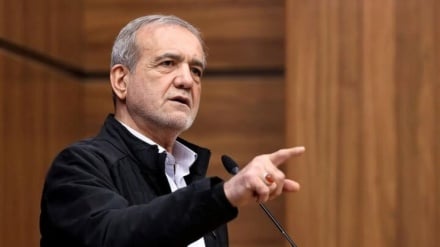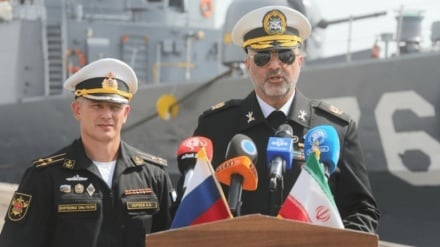West stirs Islamophobia and Iran phobia campaigns (1)
One of the most important goals of Iran phobia and Shia phobia propaganda campaigns is to obstruct the emergence of Islamic Iran as a role model for regional countries; to impede the establishment of regional security arrangements with the participation of Iran; to change Iran’s behavioral pattern; and to provoke disputes in the Iranian community.
Throughout the recent decades, especially in the aftermath of 9/11, the Americans have shown a discriminatory behavior toward Muslims. In fact, after 9/11, a total of 700,000 Muslims were interrogated in the US. This comes while Islam is the fourth largest religion in the US, after Christianity, Judaism, and Buddhism. Muslims reside in different parts of US. However, in the wake of 9/11, rancor has been fueled against Muslims in that country. Meanwhile, the Western regimes, led by the US, provoke resentment toward Islam among the Western troops.
The Western regimes have stoked their Islamophobia propaganda campaign in recent years, while Takfiri terrorists have fanned the flames of Islamophobia. West’s propaganda campaigns against Islam and Iran have left a significant impact on the thoughts of Westerners. In accordance to an opinion poll which has been carried out in the US, only 37% of Americans approve of Islam, while 22% of Americans don’t want a Muslim to be their neighbor. In accordance to another opinion poll in the year 2011, Islamophobia has significantly surged in the West in the last decade. For instance, hundreds of troopers in the West have registered for participation in a round of military operations against what is referred to as Islamic radicalism.
In fact, it should be said that one of the goals and intentions of the West in its Islamophobia campaign is to depict a false image of the divine religion of Islam for Western nations.
The West takes advantage of media to misrepresent many realities and facts.
Meanwhile, one of the goals of West’s Islamophobia campaign is to impede the Islamic culture from challenging liberal democracy. Throughout the Cold War era, in addition to an arms race between the Communist East and Liberal West; the two world powers tried to defeat each other’s cultures. Upon the collapse of Eastern bloc in the early 1990s, West imagined that no other culture would be able to challenge liberal democracy. Even, some of the theorists of liberal democracy culture spoke of the end of history and alleged that the liberal democracy culture has been accepted by mankind as the ultimate culture, and will not be challenged by any other culture. But, later on, a number of developments took place, while some of the Western theorists, such as Samuel Huntington, presented the theory of ‘clash of civilizations’, stating that Islamic culture and civilization intends to challenge Western culture.
In the meantime, upon the victory of Islamic Revolution in Iran; and the mounting resentment toward the West in recent decades, a fresh wave of Islamic awakening took shape. This development, in addition to a number of other events, seriously challenged the West.
Western analysts believe that the West, in an effort to obstruct any challenges against liberal democracy, baselessly claims that Islam doesn’t maintain any shared values with other religions and promotes violence. Such baseless allegations have fueled Islamophobia in Western communities.
Another intention and goal of the US and the West in fueling Islamophobia is to justify the Western regimes’ military presence in the region; to cause disputes among Islamic countries; and to maintain the security of West’s regional allies. West’s military presence in the region maintains a long precedent. Upon the failure of the US in Vietnam, it was stated that the West doesn’t need a direct military presence in the sensitive regions of the world. Based on this belief, in every region, West’s client regime(s) should pursue Western regimes’ goals.
However, after the victory of Islamic Revolution in Iran; Saddam regime’s war on Iran and Kuwait, in addition to a number of other developments, the West once again thought of direct military presence in the sensitive regions, including Middle East and West Asia.
On this basis, Americans, in an effort to achieve economic, military, and technological superiority, developed their military bases in different regions of the world under the pretext of maintenance of international security. The American statesmen make strenuous efforts to achieve their sinister goals.
The West, with its direct presence in the region, intends to contain and control Islamic Iran. In the past three decades, the US has buttressed regional dictators and has made every effort to somehow isolate Iran in the region, but to no avail. This strategy includes imposition of illegal sanctions against Iran and an anti-Iran psychological warfare.
One of the baseless US anti-Iran allegations, which intended to pile up pressure on Iran, was US officials’ unfounded claims about Iran’s peaceful nuclear activities.
The American theorist, Noam Chomsky, has vividly pointed out the hostile policies of the US, noting that the US officials tell Arabs that Iran is their enemy. The US, he adds, intends to obstruct independence of regional countries. He notes that the US policy is based on this country’s interests.
This American theorist admits given that Iran doesn’t toe the US line, it is introduce as a threat by the US.
Chomsky notes for centuries, Iran has not taken any action against other countries.
One of the other root causes of the opposition of hegemonic powers toward Islamic Republic of Iran is Tehran’s opposition toward US regional plots, such as Iran’s opposition to US military interferences in the region, under the pretext of maintenance of regional peace and security.
The US considers Iran as an impediment against its meddlesome policies in the region and has therefore baselessly claimed that Iran supports terrorism.
A number of Western theorists opine that as of the victory of Islamic Revolution in Iran in the year 1979; the Western powers, especially the US and Britain maintained pessimistic and suspicious views toward Iran, groundlessly accusing Iran of export of terrorism.
The American Israel Public Affairs Committee (AIPAC), which is Israeli regime’s important lobby in the US, insists on three points in relation to the US hostility toward Iran, which are namely restriction of Iran’s nuclear plan; imposition of wide-scale sanctions against Iran; and US unwavering support for Zionist regime’s policies.
MR/SS


